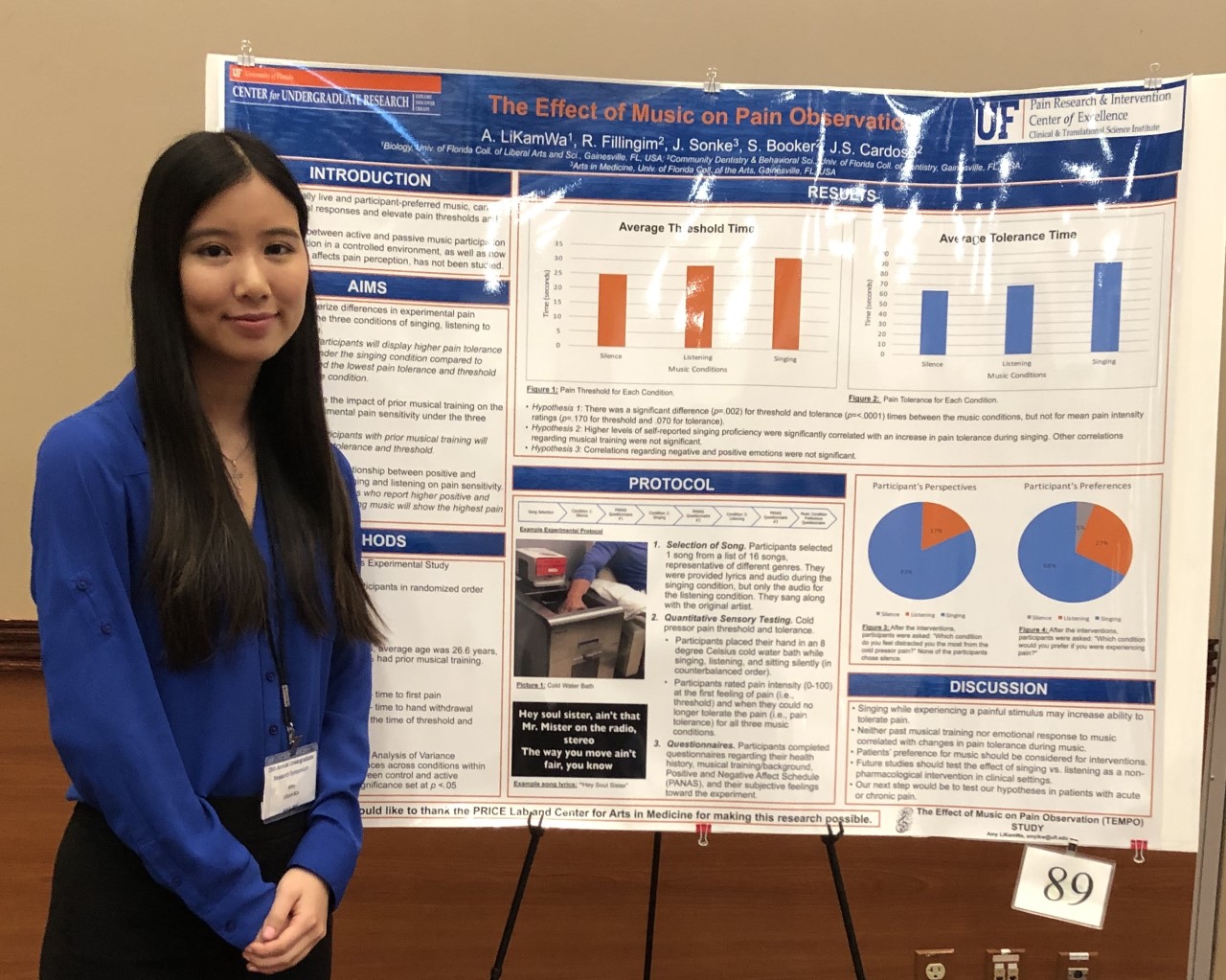Singing increases pain tolerance, undergraduate researcher finds

Recent University of Florida graduate Amy LiKamWa published an article in Arts and Health, an international journal for research, titled “The effect of music on pain sensitivity in healthy adults.”
LiKamWa had an early interest in music, having been a violinist since age 8, and she developed a fascination with the application of music in medicine during her studies at the University of Florida.
She enrolled in a music and health course her first year where she learned about how music can help alleviate pain. That’s when she decided to become a research volunteer at the Pain Research and Intervention Center of Excellence (PRICE), and at the end of her second year, there was an opportunity for her to conduct independent research in affiliation with the UF Center for Arts in Medicine.
As an avid musician, LiKamWa was a member of the University Orchestra but slowly had to devote more time to her pre-med courses.
“I couldn’t keep up with being in the University Orchestra and being pre-med, but I loved music so I wanted to find a way to keep it in my life,” LiKamWa said. “Creating a research project with music was actually really awesome for me.”
In 2018, LiKamWa was recognized as a University Scholar, a competitive scholarship program awarded to only 200 undergraduate researchers at UF, which jump-started her research on the effects of music on pain sensitivity. She confessed that part of her inspiration for incorporating music in the study came from many karaoke nights in addition to her personal experiences as a musician.
Over the next few years, she underwent a rigorous process that not many undergraduates have the opportunity to experience. In the summer following her award from USP, a draft of the study was submitted to the Institutional Review Board. After they approved, LiKamWa was ready to conduct her study.
Working with 40 healthy adults, she measured pain sensitivity under three conditions: singing, listening to music, and sitting in silence. All participants were allowed to choose which song to sing along with and listen to before being given a cold water bath for their hands.
She discovered that those who sang had the highest tolerance and threshold for pain, with listening to music at a close second and sitting in silence trailing behind. After the test was complete, participants were asked to fill out a questionnaire as a means of gathering data. The questionnaire included questions such as “Which condition do you feel distracted you the most from the cold pressor pain?” or “Which condition would you prefer if you were experiencing pain?”
After completing the study, LiKamWa synthesized the data to formally write an honors thesis and submitted an article for publication in Arts and Health. Her study was accepted, but the review process to get it to publication was intense.
One anonymous reviewer ended their report by saying, “This is an interesting but careless report,” which LiKamWa said felt like a blow to the integrity of her work.
“I felt really embarrassed, and thought I was wasting my advisers’ time,” she said. “But I had to focus on what to do going forward.”
With the help of mentors, LiKamWa addressed all 64 requested revisions, and the second version was approved and published in September 2020. That same reviewer stated, “Many thanks for addressing my points, and congrats for getting the publication.”
“Rely on your mentors,” LiKamWa said. “They’re experienced for a reason. Mine were able to contest some of the comments. And they were so nice about helping me.”
One of LiKamWa’s mentors Jill Sonke said she had never seen such a fierce review process.
“Amy very courageously met this challenge and has now made a really important contribution to the scientific literature. She exemplifies that undergrad students can be serious researchers, especially when they follow their passion,” said Sonke, the director of the Center for Arts in Medicine.
With a Bachelor of Science in Biology and a Music in Medicine Certificate in hand, LiKamWa has her sights set on medical school.
She hopes to one day expand her research to working with a patient population. She believes that using music as a non-pharmacological tool in clinical settings would yield positive results, reaching a demographic that desperately needs pharmaceutical alternatives. Moreover, music could also be helpful in adjunct with more traditional treatments.
“Music is less invasive, less harmful, and less expensive because medications can be really expensive compared to the simple use of music,” she said.
LiKamWa gives credit to her mentors and collaborators Josue Cardoso, research technician at PRICE; Jill Sonke, Director of the Center for Arts in Medicine; Roger B. Fillingim, the director of PRICE, and Staja Q. Booker, assistant professor in the UF College of Nursing.